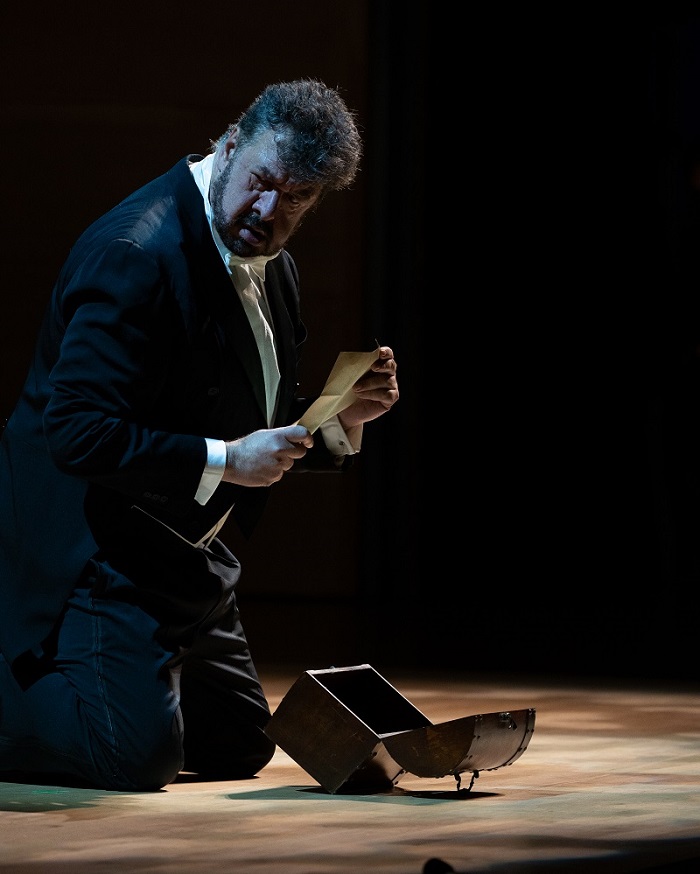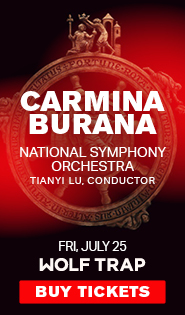Maryland Lyric Opera’s fine cast ends season with sinister “Don Carlo”

Bass Andrea Silvestrelli sang the role of King Phillip II in Verdi’s Don Carlo with Maryland Lyric Opera on Friday evening. Photo: Julian Thomas
Feeling cynical about the intersection of religion and politics for some reason? Giuseppe Verdi’s darkest grand opera, Don Carlo, may be just the thing you need right now. Maryland Lyric Opera is closing out its half-season with a semi-staged production, featuring a ferocious cast and mammoth orchestra, heard Friday evening in the Music Center at Strathmore.
Music director Louis Salemno presided over Verdi’s 1884 Milan version of the opera, trimmed down to four acts from its premiere as a five-act grand opera in Paris in 1867. This cast was as strong as the one heard in the last local staging of the work, by Washington National Opera in 2018, a velvet-gloved swan song by that company’s departing music director, Philippe Auguin.
Arturo Chacón-Cruz made his MDLO company debut, with heroic high notes and lyric beauty in the title role. The Mexican-born tenor last sang in the area over a decade ago, in a series of roles with Washington National Opera early in his career. His voice and technical assurance have grown considerably in the intervening years, and he managed to make the character of the maligned heir to the Spanish throne both hateful and sympathetic.
Cuban-American soprano Elaine Alvarez also made her company debut as Elisabetta, the French princess in love with Don Carlo but now married to his father, King Filippo. Her voice gleamed with power, but she could also moderate that volume with subtlety, matching beautifully with Chacón-Cruz’s lighter sound in their Act I scene. That more plangent side of her tone gave poignancy to delicate arias, like “Non pianger mia compagna” in Act I. The tragic duet with Carlo at the opera’s conclusion ached with anguish.
Bass-baritone Mark Delavan, an MDLO regular, brought incisive strength to the role of Rodrigo, the Marquis of Posa and Carlo’s devoted friend. He also scaled down his voice to pair sweetly with Chacón-Cruz in their moving Act I duet, “Dio, che nell’alma infondere.” At times Delavan seemed a little uncertain, but Salemno’s careful conducting helped him navigate minor slips with the text or when he rushed ahead of the beat.
Mezzo-soprano Catherine Martin, remembered fondly from her time in WNO’s Cafritz Young Artists program, made a fiery Princess Eboli. She was flirtatious in her “Veil Song” and then just as venomous when she learned she was not loved by Carlos, unleashing a wave of sound in the striking Act II scene with Carlo and Rodrigo. Her Act III showpiece, “O don fatale,” featured blistering high notes of rage.
Bass Andrea Silvestrelli, who was an astounding Grand Inquisitor in the 2018 WNO production, gave the same stentorian intensity to the role of King Filippo. In the scene with Rodrigo at the end of Act I, where Posa spoke truth to monarchical power, the menace of the king in response was all too real. At the same time, in the lament at the start of Act III, when the king realized that the queen loves his son and not him, Silvestrelli moaned and sobbed with moving delicacy.
The supporting cast excelled, especially the beefy Grand Inquisitor of Kenneth Kellogg and the robust Frate of SeungHyeon Baek, who was heard equally well from the upper balcony as from the stage. The chorus of 77 voices, seated in the first balcony over the stage and singing from memory like the principals, roared impressively in the big choral displays, beginning with the basses chanting as the monks in the opening scene.
The company also fielded the complete instrumentation for this weighty score, with excellent contributions all around. Four horns played the Act I introduction with heraldic polish. The amassed brass section, including two cornets and two trumpets, added a regal flourish to the entrance of the king and queen. The three flutes shimmered in the Act III quartet, and the bassoons and contrabassoon rumbled with the entrance of the Grand Inquisitor.
All of this musical agglomeration reached its apex in a stunning auto-da-fé scene at the end of Act II. The massive banda, seated offstage to the left beyond a large opened stage door, featured all the instruments Verdi called for, including D clarinet-terzino, flugelhorns, and bass tubas, all crisply coordinated by Husan Park. The antiphonal interplay among onstage orchestra, offstage banda, chorus above, and principals on the platform was dizzying in scope.
Although there were no costumes, visual supervisor David Gately oversaw an effective semi-staging. Effective lighting (designed by Stuart Duke) added just enough dramatic spectacle, as with the throbbing red lights evoking the cleansing fire consuming the heretics at the end of the auto-da-fé. Projections designed by Sarah Tundermann drew heavily on the paintings of El Greco for Spanish flavor and apocalyptic fervor, including his View of Toledo and Vision of St. John, as well as Goya’s Inquisition Tribunal.
Don Carlo will be repeated 2 p.m. Sunday in the Music Center at Strathmore. mdlo.org


Posted May 16, 2022 at 4:35 pm by Richard Carlson
Seen Sunday afternoon, beautiful singing and orchestral playing, very unfortunate the audience was so small.